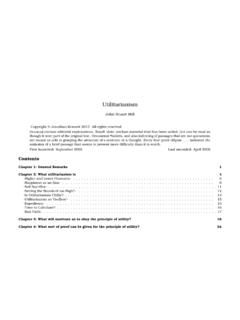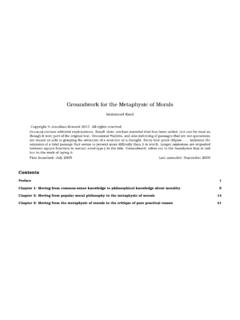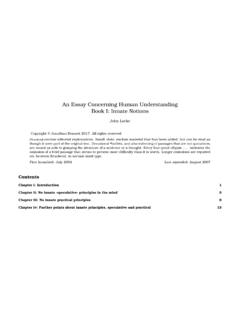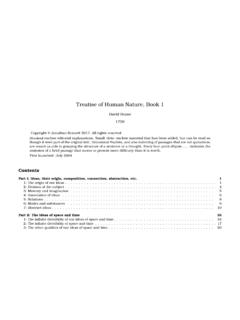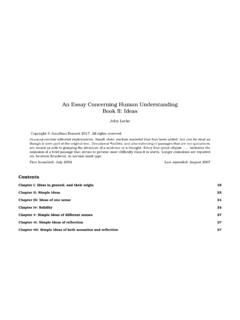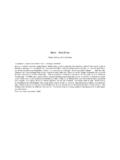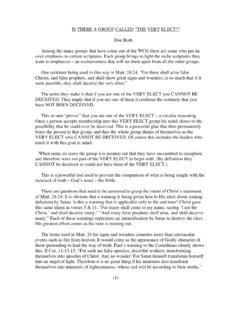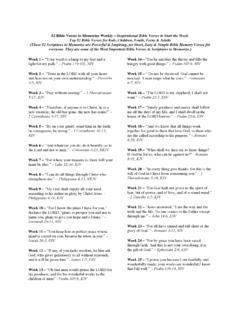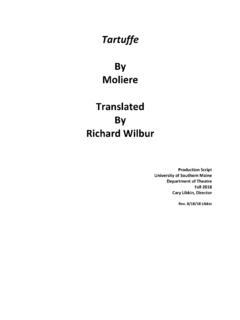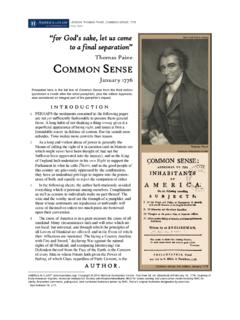Transcription of Meditations on First Philosophy in which are demonstrated ...
1 Meditations on First Philosophyin which are demonstrated the existence of God and the distinction betweenthe human soul and bodyRen DescartesCopyright Jonathan Bennett 2017. All rights reserved[Brackets]enclose editorial explanations. Small dots enclose material that has been added, but can be read asthough it were part of the original text. Occasional bullets, and also indenting of passages that are not quotations,are meant as aids to grasping the structure of a sentence or a thought. Every four-point ellipsis .. indicatesthe omission of a brief passage that seems to present more difficulty than it is worth.
2 In his title for this work,Descartes is following a tradition (started by Aristotle) which uses First Philosophy as a label for launched: July 2004 Last amended: April 2007 ContentsFirst Meditation1 Second Meditation3 Third Meditation9 Fourth Meditation17 Fifth Meditation23 Sixth Meditation27 MeditationsRen DescartesFirst MeditationFirst meditation :On what can be called into doubtSome years ago I was struck by how many false things Ihad believed, and by how doubtful was the structure ofbeliefs that I had based on them. I realized that if I wantedto establish anything in the sciences that was stable andlikely to last, I needed just once in my life to demolisheverything completely and start again from the looked like an enormous task, and I decided to wait untilI was old enough to be sure that there was nothing to begained from putting it off any longer.
3 I have now delayedit for so long that I have no excuse for going onplanningto do it rather than getting to work. So today I have set allmy worries aside and arranged for myself a clear stretch offree time. I am here quite alone, and at last I will devotemyself, sincerely and without holding back, to demolishingmy can do this without showing that all my beliefs are false, which is probably more than I could ever manage. My reasontells me that as well as withholding assent from propositionsthat are obviously false, I should also withhold it from onesthat are not completely certain and indubitable.
4 So all Ineed, for the purpose of rejecting all my opinions, is to findin each of them at leastsomereason for doubt. I can dothis without going through them one by one, which wouldtake forever: once the foundations of a building have beenundermined, the rest collapses of its own accord; so I willgo straight for the basic principles on which all my formerbeliefs I have accepted until now as most true hascome to me through my senses. But occasionally I havefound that they have deceived me, and it is unwise to trustcompletely those who have deceived us even once.
5 [The next paragraph presents a series of considerations back andforth. It is set out here as a discussion between two people, but that isn thow Descartes presented it.]Hopeful: Yet although the senses sometimes deceive usabout objects that are very small or distant, that doesn tapply to my belief that I am here, sitting by the fire, wearinga winter dressing-gown, holding this piece of paper in myhands, and so on. It seems to be quite impossible to doubtbeliefs like these, which come from the senses. Anotherexample: how can I doubt that these hands or this wholebody are mine?
6 To doubt such things I would have to likenmyself to brain-damaged madmen who are convinced theyare kings when really they are paupers, or say they aredressed in purple when they are naked, or that they arepumpkins, or made of glass. Such people are insane, and Iwould be thought equally mad if I modelled myself on (sarcastically): What a brilliant piece of reason-ing! As if I were not a man who sleeps at night and often hasall the same experiences while asleep as madmen do whenawake indeed sometimes even more improbable ones. Oftenin my dreams I am convinced of just such familiar events that I am sitting by the fire in my dressing-gown when infact I am lying undressed in bed!
7 Hopeful: Yet right now my eyes are certainly wide openwhen I look at this piece of paper; I shake my head and itisn t asleep; when I rub one hand against the other, I do itdeliberately and know what I am doing. This wouldn t allhappen with such clarity to someone DescartesFirst MeditationDoubtful: Indeed! As if I didn t remember other occasionswhen I have been tricked by exactly similar thoughts whileasleep! As I think about this more carefully, I realize thatthere is never any reliable way of distinguishing being awakefrom being asleep. This discovery makes me feel dizzy,[joke:] which itself reinforces the notion that I may be asleep!
8 Suppose then that I am dreaming it isn t true that I,with my eyes open, am moving my head and stretching outmy hands. Suppose, indeed that I don t evenhavehands orany body at all. Still, it has to be admitted that the visionsthat come in sleep are like paintings: they must have beenmade as copies of real things; so at least these generalkindsof things eyes, head, hands and the body as a whole mustbe real and not imaginary. For even when painters try todepict sirens and satyrs with the most extraordinary bodies,they simply jumble up the limbs of different kinds of realanimals, rather than inventing natures that are entirelynew.
9 If they do succeed in thinking up something completelyfictitious and unreal not remotely like anything ever seenbefore at least the colours used in the picture must be , although these general kinds of things eyes,head, hands and so on could be imaginary, there is nodenying that certain even simpler and more universal kindsof things are real. These are the elements out of which wemake all our mental images of things the true and also thefalse simpler and more universal kinds includebody,andextension; theshapeof extended things; theirquantity,sizeandnumber; theplacesthings can be in, thetimethrough which they can last, and so it seems reasonable to conclude that physics, astron-omy, medicine, and all other sciences dealing with thingsthat have complex structures are doubtful.
10 While arithmetic,geometry and other studies of the simplest and most generalthings whether they really exist in nature or not containsomething certain and indubitable. For whether I am awakeor asleep, two plus three makes five, and a square has onlyfour sides. It seems impossible to suspect that such obvioustruths might be , I have for many years been sure that there isan all-powerful God who made me to be the sort of creaturethat I am. How do I know that he hasn t brought it aboutthat there is no earth, no sky, nothing that takes up space,no shape, no size, no place, while making sure that all thesethings appear to me to exist?

